Interview: Zachary Reeve Davidson of Coin & Ghost On Directing MAMA MAMA CAN'T YOU SEE
at Studio/Stage 11/10 to 12/10
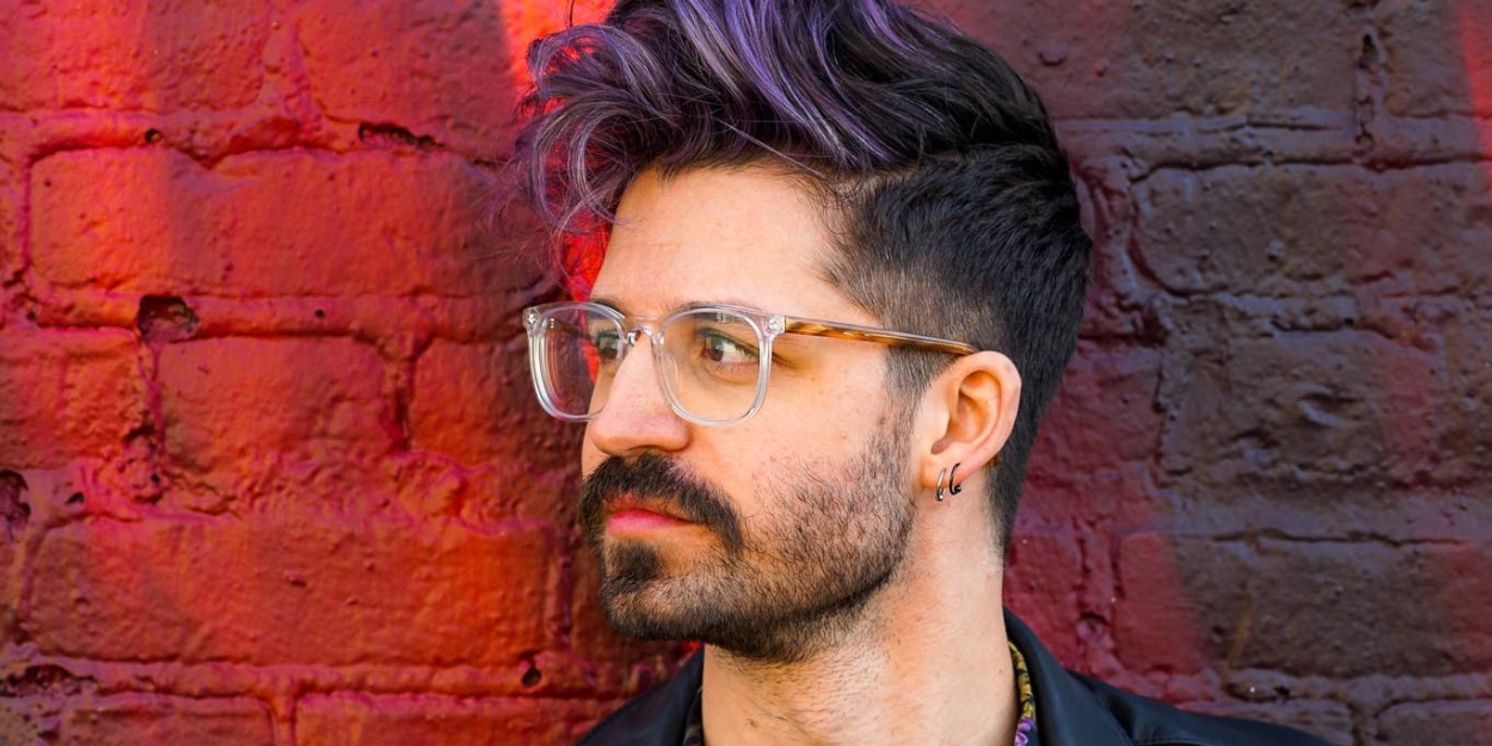
Zachary Reeve Davidson is the Founding Artistic Director of Coin & Ghost, the group presenting Mama Mama Can’t You See, an explosive new play about human connection and the mythology of war written by ex-Marine Stan Mayer and Cecilia Fairchild. Davidson is directing and choreographing, opening November 10 at Studio/Stage. Since the new play tells the story of being involved in a war from the viewpoint of a Marine, I decided to speak with Zachary about its creation and relevancy to our world today in which wars seem to be constantly in the news.
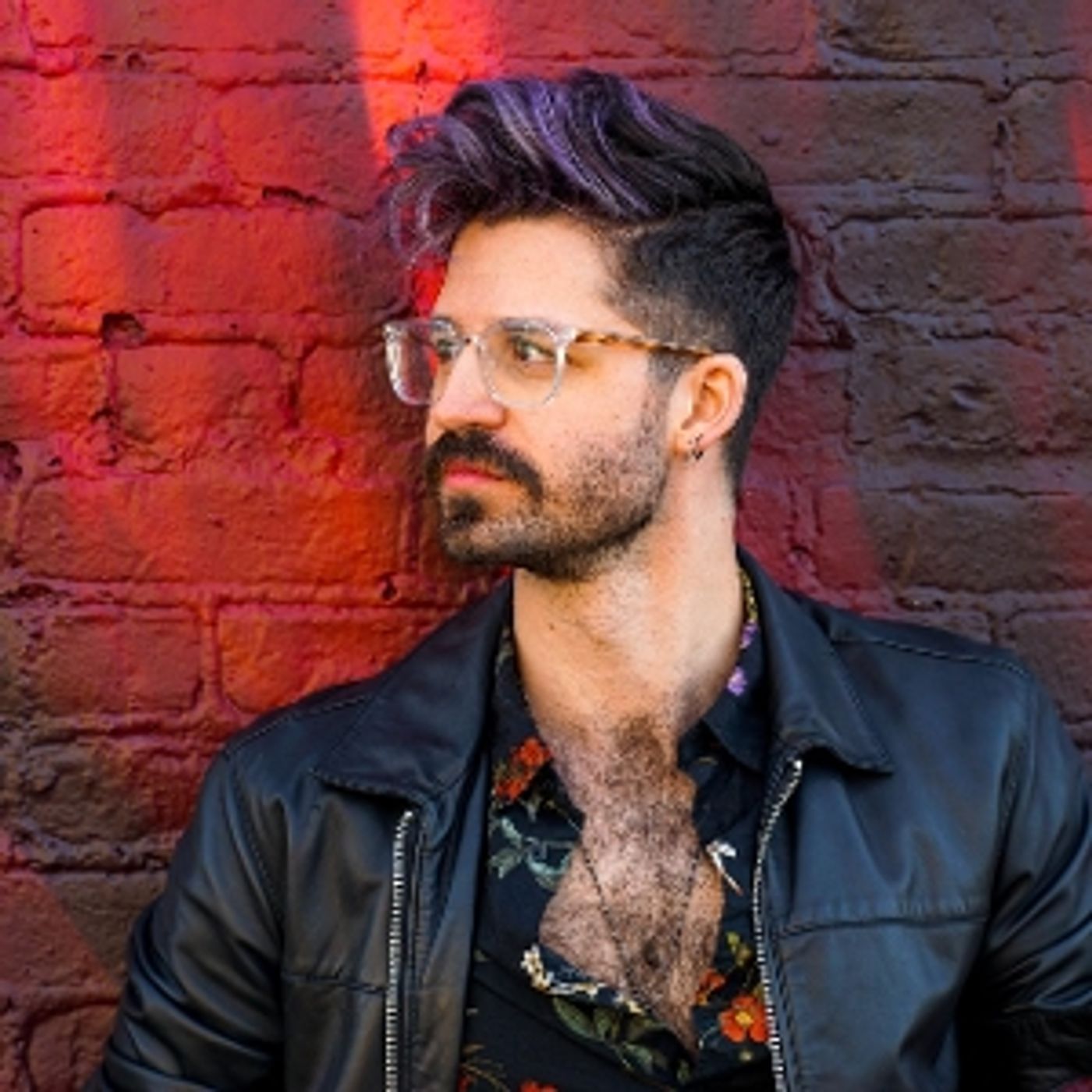
Zachary Reeve Davidson. Photo courtesy of the artist.
Hi Zachary. Thanks for taking the time to speak with me about Mama Mama Can’t You See. But before we start taking about the play, tell me about your involvement with Coin & Ghost as its founding Artistic Director.
Hey Shari! My pleasure, super excited to chat with you today. We launched Coin & Ghost in 2017, seeking to remix mythologies as a way to spark empathy, imagination, and community. We use the term “mythology” to refer to any set of stories that simultaneously shaped and was shaped by a culture; this allows us to explore not only traditionally understood myths - Greek, Roman, Creation Myths, etc. - but contemporary source material as well: comic books have a mythology to them, as do the collected works of James Baldwin.
Mama Mama represents our first foray into the world of American mythology. We take these stories that exist somewhere within our collective understanding, then collaborate with playwrights and ensemble-devising techniques to forge our own, new understanding. We remix, sample, recontextualize, adapt, and transform, filtering the source material through Coin & Ghost’s voice and aesthetic. If the mythology belongs to the collective, to the community - then the remix belongs to the artist. Our work exists to connect those elements.
As a company, Coin & Ghost is still quite young. We were only two-and-a-half years old when the pandemic hit and just starting to find our footing in this massive, beautiful Los Angeles theatre community. So in a lot of ways, it still feels like we’re right at the beginning of our journey. And as any founding Artistic Director would say, my involvement is…extensive. Whatever it takes, really. Today, that means directing and choreographing for Mama, though I anticipate taking more of a backseat on the artistic side of things soon, so I can turn my attention more towards building infrastructure and sustainability.
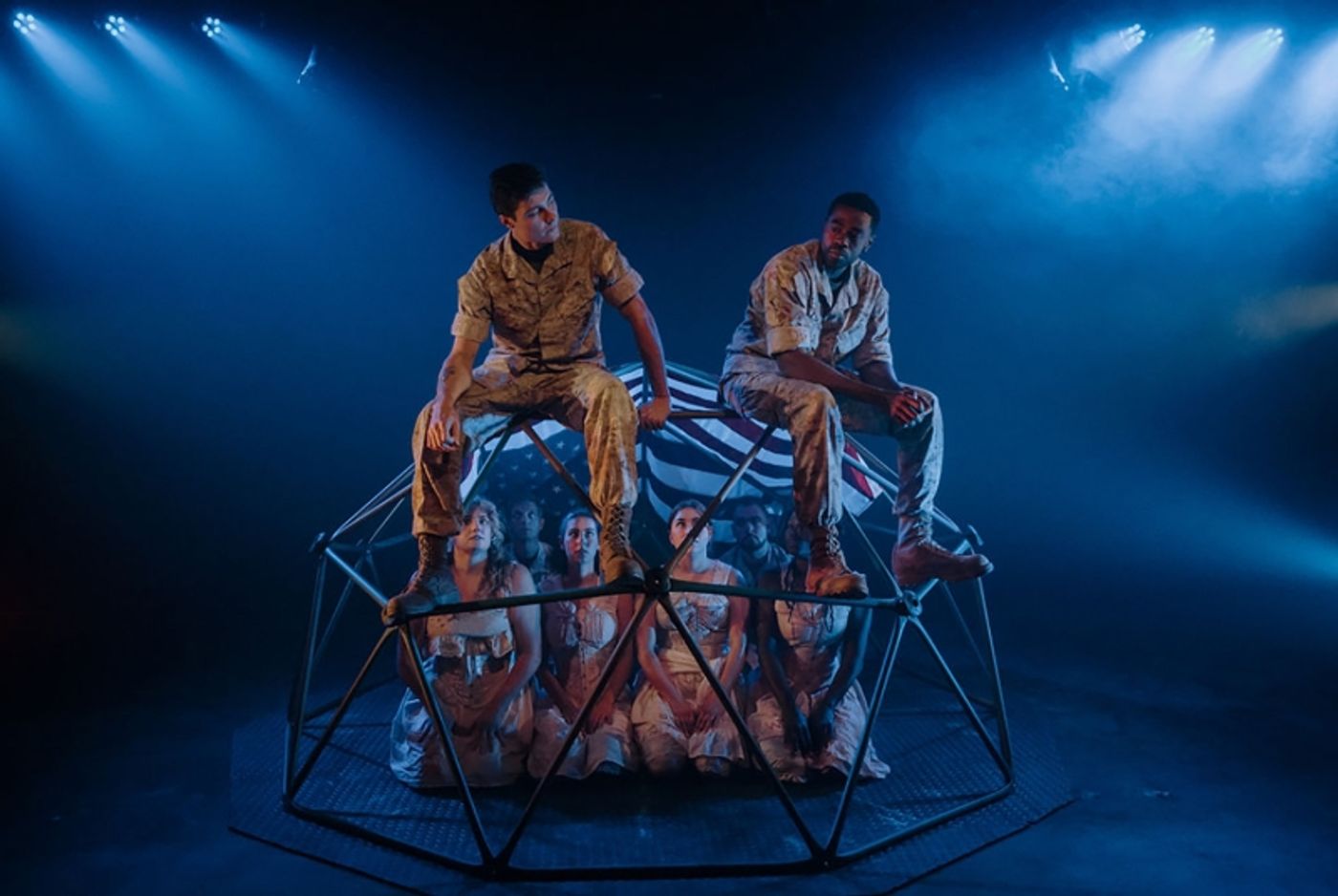
The cast of Mama Mama Can't You see. at Studio/Stage. Photo credit: Meredith Adelaide
Has Mama Mama Can’t You See been done onstage previously? And why did you decide to have Coin & Ghost produce it now?
This project has been on something of an odyssey in terms of making its way to the stage since it was originally scheduled to open on March 20, 2020. I probably don’t even need to say it, but that version never saw the light of day. We were about five weeks into a six-week rehearsal process; the show was fully staged and choreographed, we were one day away from entering tech, and the world completely shut down. I spent a good year-and-a-half in deep contemplation about the future of the piece. As a director, as a theatremaker, it was already the most exciting, rewarding piece I had ever worked on, and I was champing at the bit to get back into a room and finish the thing. As an Artistic Director, I didn’t want it to only be the first thing C&G did coming out of the shutdown because it was the last thing we were working on when the pandemic hit. I wanted to bring it back if/because it still mattered now (which was a difficult thing to contemplate, given how everyone’s life/priorities/communities shifted overnight).
What changed everything for me was a re-examination of what drives the show. At the core of this play lies a deep truth about our need to share grief and story in order to heal. And I realized that one of the more insidious losses of the pandemic was - in addition to this massive collective grief we were all experiencing - was that the pandemic had robbed us of our ability to gather as a way to support each other through what was happening. That’s what people do in extraordinary times, since at the best and worst moments of our lives, we want to be surrounded by our community. If the first wave of grief from the pandemic was the actual experience of it, the second wave was the isolation in which we all had to process it. That’s what Mama Mama illuminates, like no other play I’ve ever come across. Collective processing. Ritual gathering. What it means for a community to hold space, and how that helps move us through.
The premiere was re-scheduled for January 2022; and then a major Omicron spike nullified those plans. We rescheduled again, and were finally able to premiere the piece last May, but with an abbreviated run in the midst of yet another Omicron spike as well as over a holiday weekend. We couldn’t help but feel like there was more to explore here. Don’t get me wrong, that premiere run was extraordinary - but so much of the focus was on finally getting to share the thing at all, that we felt like there was a disconnect between how much love/care/effort we had put into the project vs. the brief, frantic window in which we got to share it.
So we brought it back. For real, this time. With a revised script and staging (based on what we learned from the first iteration), enhanced design elements, and some new folks stepping into the cast. And my goodness, you wouldn’t believe how many new, beautiful things we continue to discover about this piece.
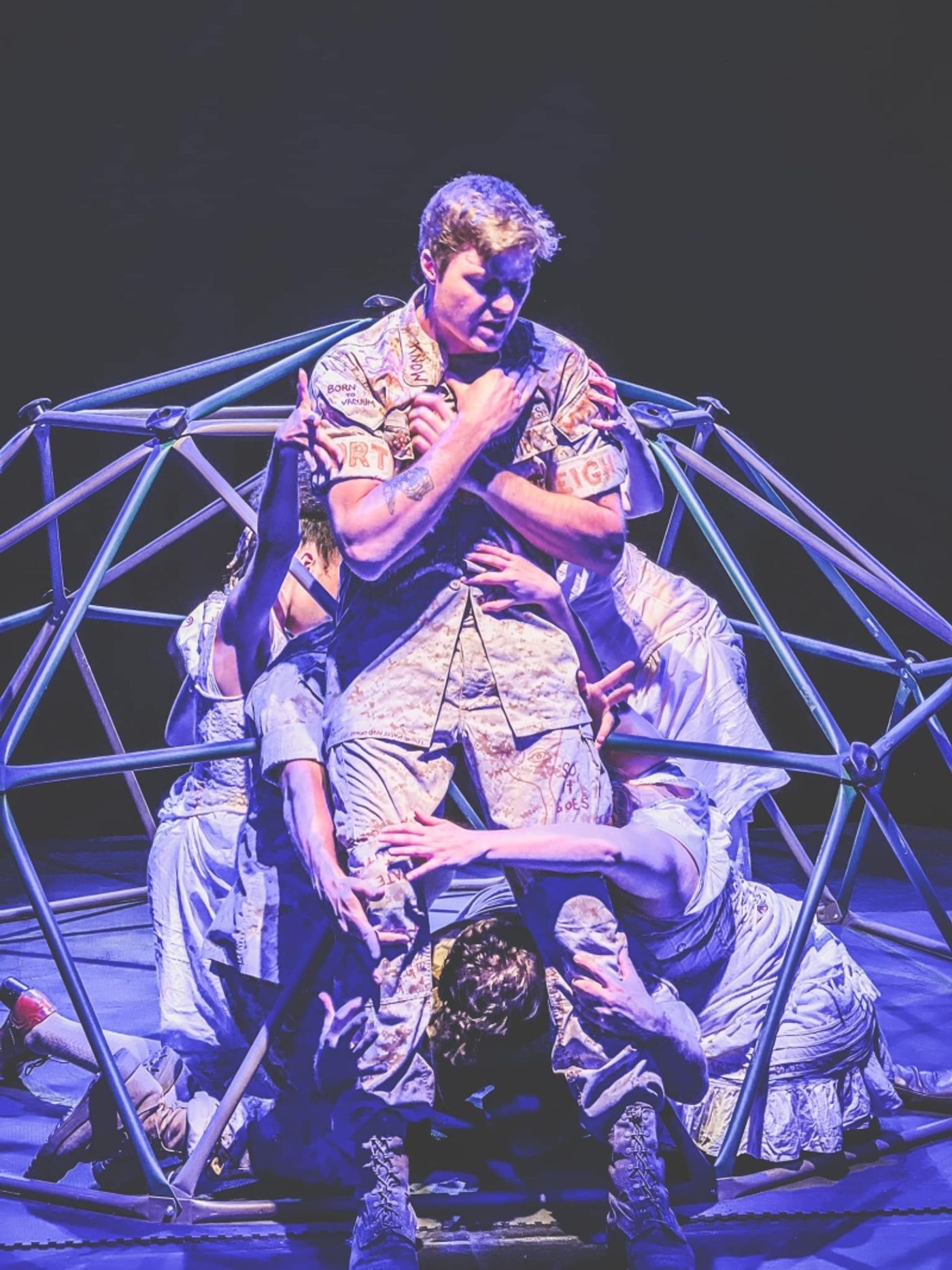
The cast of Mama Mama Can't You see. at Studio/Stage. Photo credit: Meredith Adelaide
Tell me about the story in Mama Mama Can’t You See.
Mama Mama was written by Cecilia Fairchild and Stan Mayer. Cecilia is a phenomenal playwright who Coin & Ghost has produced before (2017’s Fortunate Son: a Faust Myth); Stan is a Marine veteran who served five tours in Iraq and Afghanistan. The play centers around a true story, a particularly harrowing moment from Stan’s first tour: an ambush of his unit on the banks of the Euphrates River, during which he lost several close friends in an IED blast and the ensuing firefight. It was 18 years ago, but it feels like it’s still happening now in the way that formative moments always seem to play on a loop. So, Stan and Cecilia wrote this play about it. About storytelling. Time. Memory. Identity. And they turned this script into one of the most remarkable, theatrical things I’ve ever read.
The whole play — and this is not a spoiler, one of the characters says it at the beginning of the show - the whole play takes place inside the moment of that initial IED blast. Inside the explosion, stretched out across 90 minutes. And as different characters are dying or not dying, getting concussed or not getting concussed, their brain synapses start firing and they begin to hit each other’s memories, including stories that don’t belong to them. Moments and feelings they couldn’t possibly know about. And that becomes a way for them to collectively process whatever they’ve been through.
Recently, I heard Stan describe the show like this: “for years, every time I tried to tell this story, I would get super frustrated because it felt like I couldn’t get it right. Not the actual facts of that day, and definitely not the experience of what it felt like. That’s what this play is about: figuring out how to tell the story. The show is built around Stan (the character) calling on his friends - some who died, some who didn’t, and some who Cissy and I invented - to help him tell this story in a way that feels true.”
I’d love to share this project with as many folks as we can, it’s really something special. It’s highly physical, it’s beautifully poetic, and I’m so honored to be a part of it. Info and tickets are available at coinandghost.org/mama23.
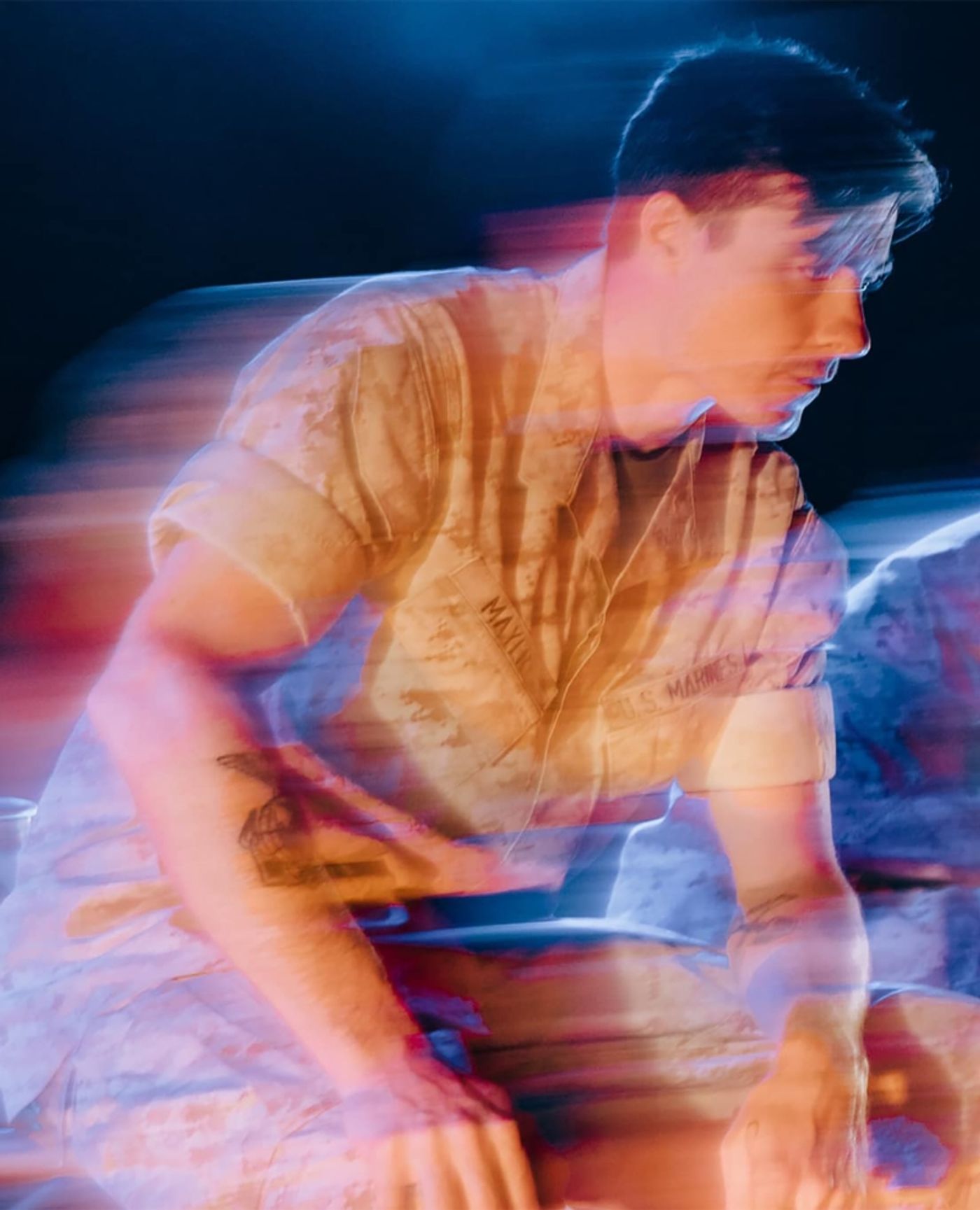
Mama Mama Can't You See stars Stan Mayer. Photo credit: Meredith Adelaide
How involved are the authors with the production at Studio/Stage?
Over the past few years, we’ve had a lot of combinations of Stan and Cecilia being involved in different ways. In the 2020 version, Cecilia was playing the role of Ellis, and Stan wasn’t in the cast at all (we had another incredible veteran actor, Matt King, playing Stan). At that point, I think Stan was hyper-focused on getting the thing written the way they wanted it and didn’t feel he could wear both hats at the same time (not to mention a couple defense contracts that took him out of the country for parts of the rehearsal process). This round it’s flipped with Stan in the cast (and leading this round of script revisions), and Cecilia is hands-off. We’ve always had an open-door policy for them both to be as actively engaged as they like, whether it’s as writers, actors, and/or producers. The way C&G collaboratively develops new works almost always involves playwrights and designers being in the room with us as often as they can.
Are you a veteran, and if so, does your own viewpoint of war figure into how you are directing and choreographing it?
I am not a veteran, though the project has certainly benefited from the experiences and perspectives of several veteran collaborators. On this current iteration, that includes Stan Mayer (Marines) in the cast and Joseph “Sloe” Slawinski (Navy) on the design team. The project was also developed with the collaboration of Matt “Doc” King (Army) and Ronin Lee (Air Force) in the cast, as well as Doug Gabriel (Army) on our production team. In addition to spanning four different branches of the military, their service experiences range from the Vietnam War to the Cold War to Iraq and Afghanistan.
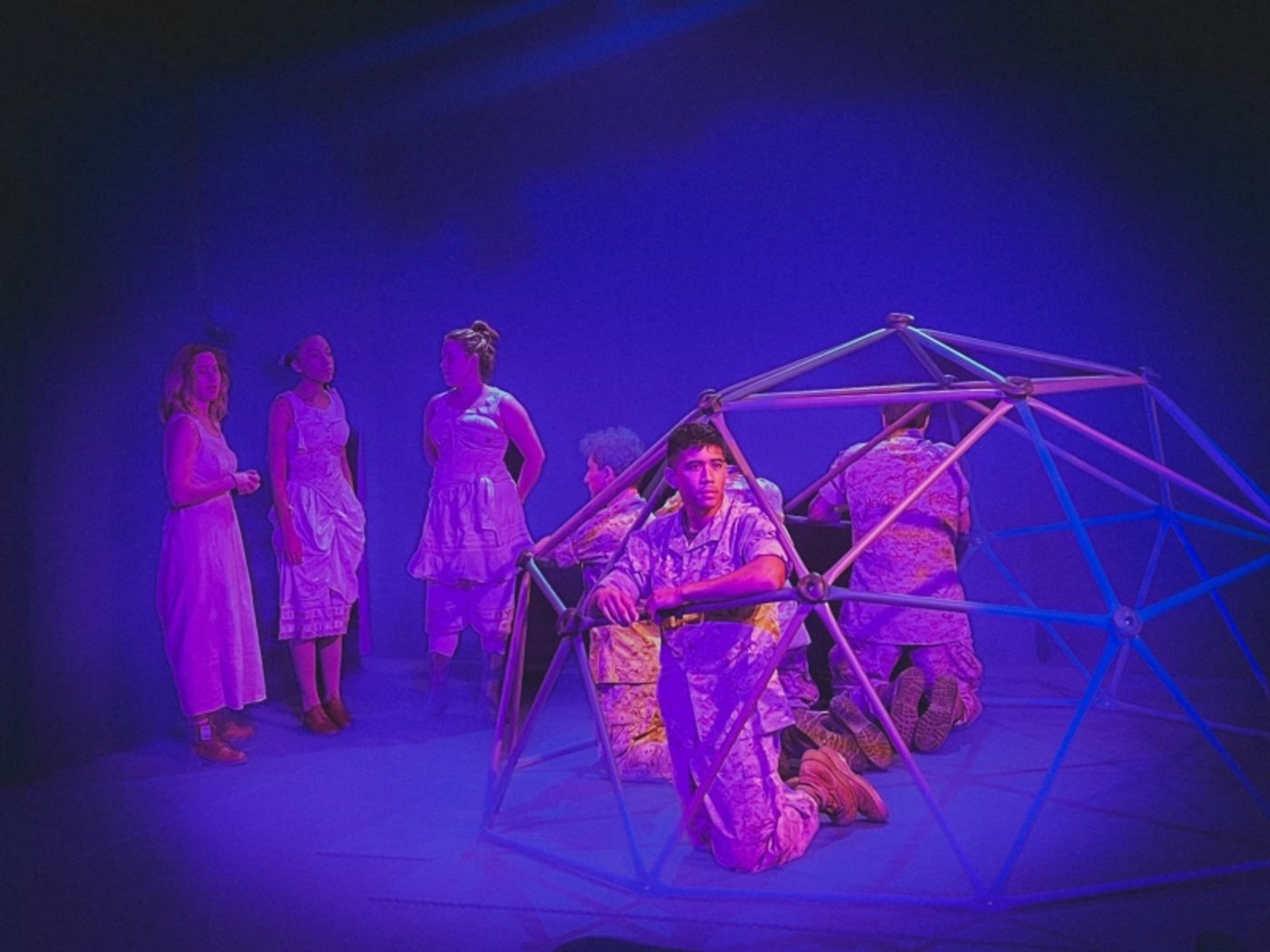
The cast of Mama Mama Can't You see. at Studio/Stage. Photo credit: Meredith Adelaide
These veteran collaborators have provided a necessary grounding in the reality, stakes, and ideas of the play. They’ve offered invaluable access to what (veteran writer) Tim O’Brien refers to as “Happening Truth,” which reflects the literal, objective facts of an event exactly as they occurred. On the other side of things, the staging and choreography seeks to draw out what O’Brien calls “Story Truth,” which reflects what the experience felt like. These extraordinary human moments, our highest highs and lowest lows, they rarely look like realism to me - and they certainly never feel like realism. So the staging and choreography provides another lens, another portal through which we can try to access these unknowable truths — truths for which words are often insufficient anyways.
Will civilian audiences enjoy the production even without any personal military experience?
The show is rooted in Stan’s experiences in the military, based on moments from the Iraq War, and half of the characters are Marines. But at its core, the play is about how we - any of us, as humans - make sense of these moments that shape our lives. We keep circling back to this idea that the show isn’t about war, it’s about how to tell a war story. How to put words to something that is completely incomprehensible, including (especially) for those who have experienced it first-hand.
After the 2022 iteration, we had so many civilian audience members come up to us after a performance and say “WOW, I would love to help you get this show in front of more military/veteran audiences, I think it could really be healing.” And at the same time, we had so many active military and veteran audience members come up to us and say “WOW, I would love to help you get this show in front of more civilian audiences. I think it could really help them understand what it felt like for us.” That’s what we’re doing here. That’s the thesis - not a pro- or anti-war treatise, but what does it mean to get it, what does it mean to understand something that simply cannot be understood. That’s the bridge we’re trying to build.
Tell me about the actors and their characters.
The play has eight characters: four Marines from the Iraq War, and four Whores from the American Civil War.
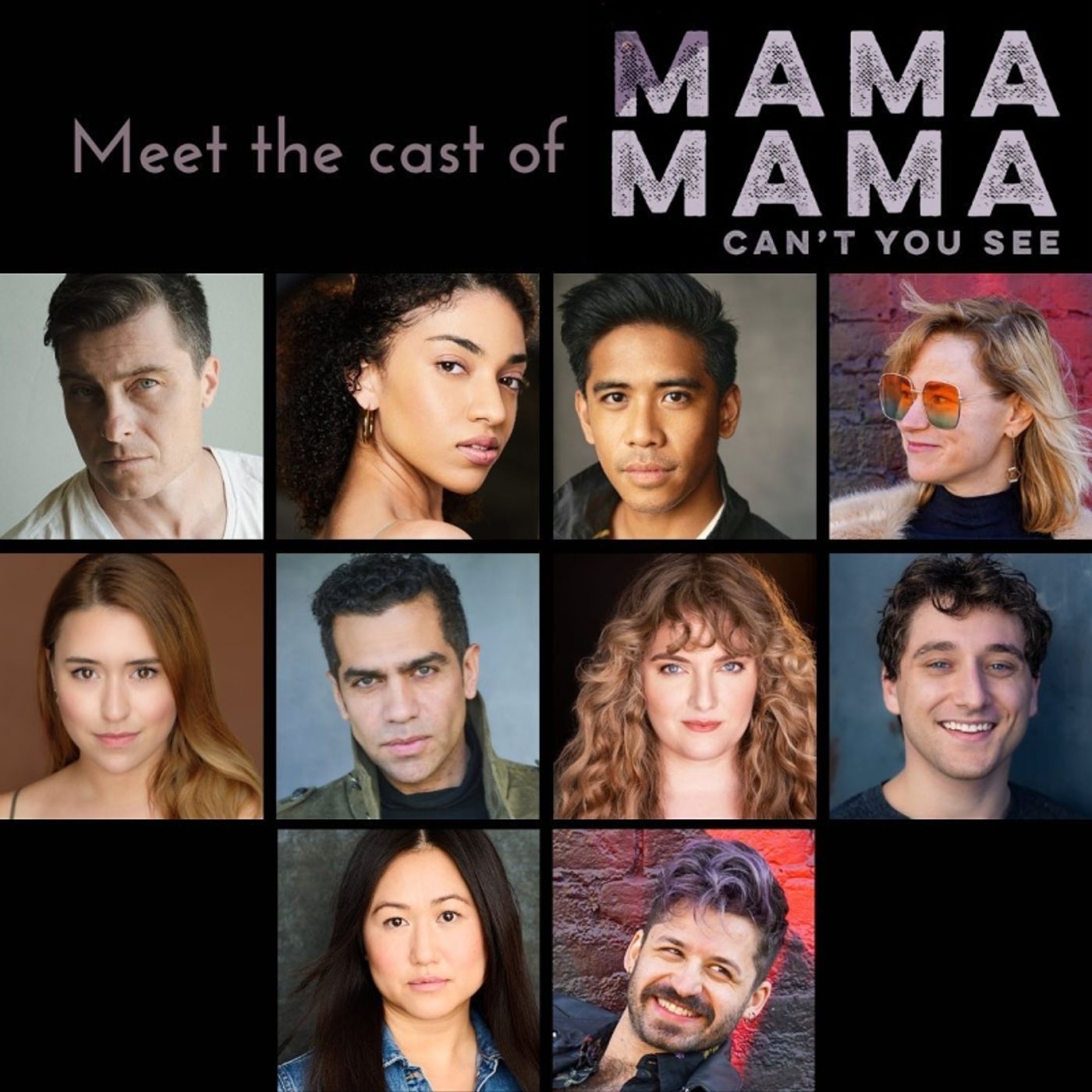
Top row: Stan Mayer as Stan, Carene Rose Mekertichyan as Anita, Ryan Nebreja as Lance, and Marguerite French as Ellis.
Middle row: Hannah Trujillo as Wanda, Julián Juaquín as Jeff, Kathleen Leary as Clem, and Zack Rocklin-Waltch as Doc.
Bottom row: understudies Stephanie Lee and Zach Davidson
The Marines are Stan Mayer (played by the real-life Stan), Jeff Schuller (played by Julián Juaquín), Lance Graham (played by Ryan Nebreja), and Jeffrey “Doc” Weiner (played by Zack Rocklin-Waltch). Lance and Doc were both killed in action on May 7, 2005 (the jumping off point of our play) while Stan and Jeff both survived the war(s).
The Whores are Ellis (played by Marguerite French), Anita (played by Carene Rose Mekertichyan), Clem (played by Kathleen Leary), and Wanda (played by Hannah Trujillo). We also have one amazing cover, Stephanie Lee, who is understudying all four Whores.
I gotta tell you, Shari - I’ve been making theatre long enough to know when a cast is special. This cast is SPECIAL, all caps. And I am out-of-my-mind lucky as a director to have them all in the room. They are generous, brave, funny, giving, and talented as all hell, and I love the way they take care of each other, and the play, and the audience.
Finally - it feels important to address the use of the word “Whore,” which is used in this play with love, with respect, and without derogatory intent. To excerpt a wonderful script note from Cecilia: “I long for a single word to describe these women - something short, hot, beautiful, theatrical, full; something worthy of the kind of service they provide. The word whore is often used as an insult, but in my research, I found that it shares its roots with dear, loved, and desire. I like that very much. The women in this play are called Whores because they are dear, and loved, and desired - and because in their work they put their skin in the game to show dearness, love, and desire to those who place monetary value on their service.”
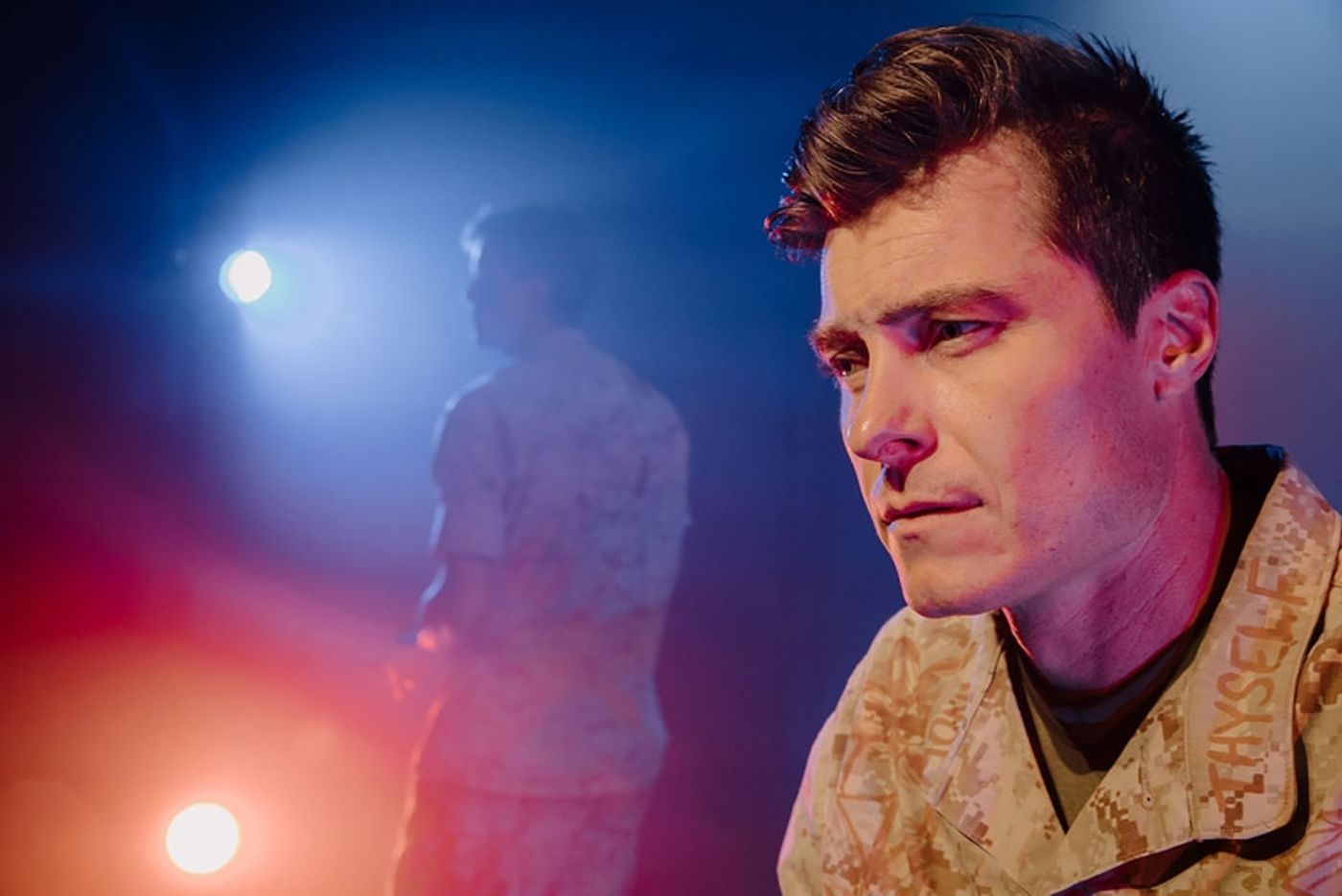
Mama Mama Can't You See stars Stan Mayer. Photo credit: Meredith Adelaide
Tell me how their stories interact in the play, since they are from two different time periods.
As I mentioned earlier, the primary structural conceit of the play is that it takes place entirely inside the moment of an explosion, one in which some of the characters die. Think of it as the moment sleeping and waking - it’s not quite purgatory, it’s not quite a multiverse/alternate reality situation - it’s just this liminal space that exists somewhere between alive and the other thing. Nick Cave has this quote where he refers to this space as “the edge of potentiality, adjacent to death, in a kind of poetic twilight world.” Tim O’Brien tells us that “the bad stuff never stops happening: it lives in its own dimension, replaying itself over and over.” Stan, most frequently, refers to this space as “our fucked-up snow globe.” That’s the primary setting for this play.
Sure, we hop back into Haditha (or over to Cleveland) for a scene every now and again. But the bulk of this play happens in this liminal, in-between space, where all eight characters have been placed to help each other work through the telling of the story.
“Why are the Whores in this script” might be my favorite question to explore, because I think it’s the key to understanding what this show is. Ostensibly, you could tell Stan’s story of May 7 without the Whores written in at all. But that’s not the way the play was written; which tells me that May 7, on its own, is not the reason this play exists. That the reason has something to do with the sharing of the story, not just the content of the story. These eight characters need each other, so they find each other. And because the play also deals with our perception (and the fluidity) of time, memory, and identity, the Whores also provide a theatrical device through which we get to explore the perspectives of the mothers, wives, girlfriends, and everyone else who’s left to pick up the pieces when these Marines do/don’t come home.
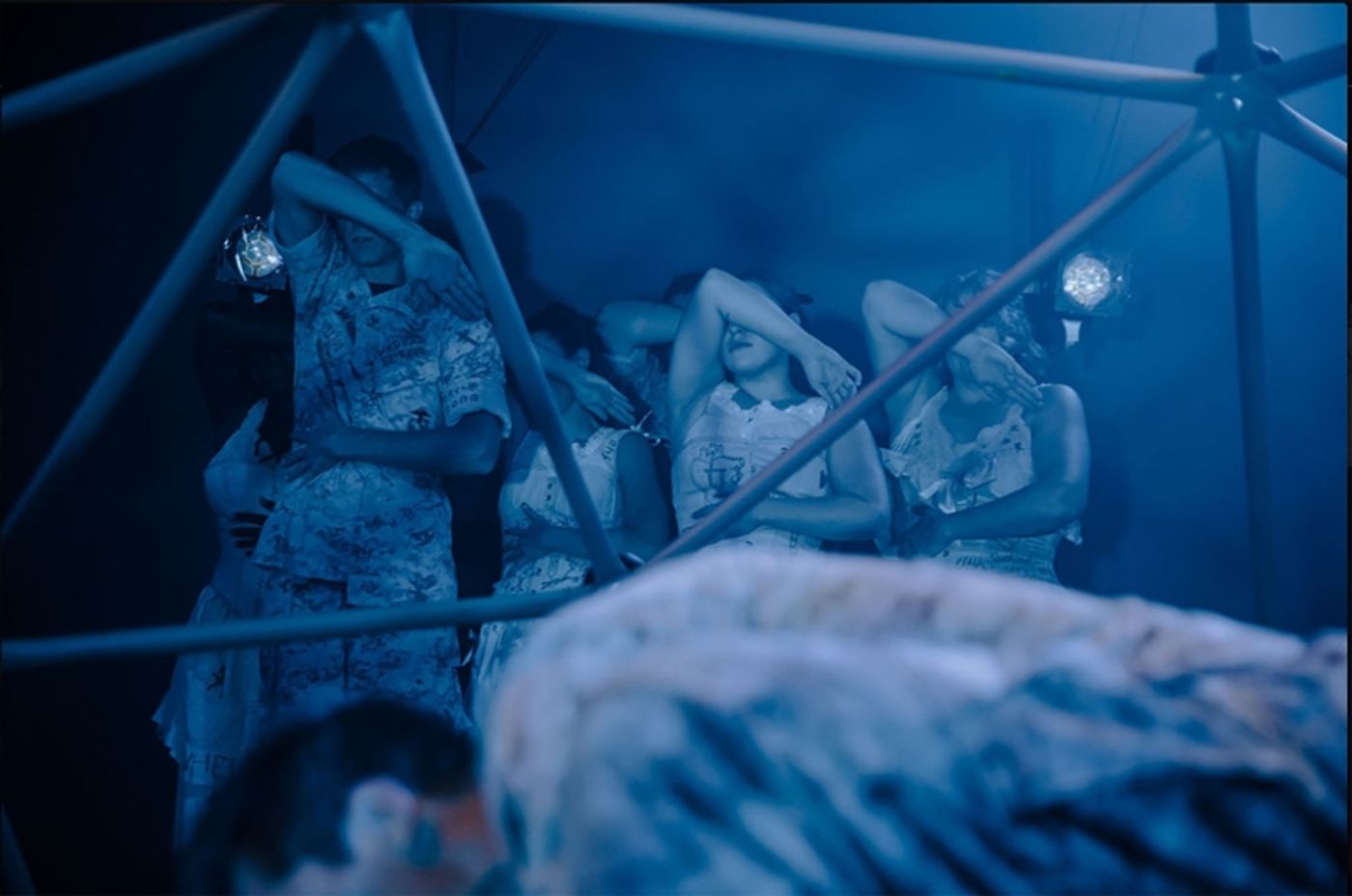
The cast of Mama Mama Can't You see. at Studio/Stage. Photo credit: Meredith Adelaide
Have you worked with any of the actors previously? Was casting done from within Coin & Ghost, or open to others to audition?
This cast is an awesome mix of new and returning performers. For Coin & Ghost, yes, but even just for this one play. Two of our nine actors, Kathleen and Hannah, have been with the piece for all three iterations. Another two, Stan and Julián, have worked on two of the three. The other five are new to the piece, including three folks who have never worked with C&G before. We love the network of collaborators we’ve built, and simultaneously, we recognize that all those collaborators, at one time, were new to us. So we’re always looking to cast shows with a blend of familiar faces and fresh collaborators!
The Coin & Ghost creative team includes scenic designer Elisa Rosin; lighting designer Joey Guthman; sound designer Joseph “Sloe” Slawinski; costume designer Athena Lawton; and intimacy director Carly DW Bones. The production manager is Veronica Bowers and the production stage manager is Mads Felder. Have you worked with any of them before?
Goodness me, yes! This design and production team reads like a “Who’s Who” of the people I’ve worked with the most. Elisa and Athena headline that list, as I’ve been collaborating with them regularly on projects in 2013 and 2012, respectively. Full disclosure, Elisa is my wife, so I may be biased, but she’s also an absolutely kickass collaborator. On this project, she’s done our scenic design, vocal arrangement/music direction, and co-choreographed the show (in addition to wearing about a dozen other hats that fall under the “producer” heading). Athena and Joey both designed for C&G’s inaugural production in 2017 (and on several projects since), while Sloe, Mads, Carly, and Veronica all hopped onboard on previous iterations of the play.
Four of these designers - Elisa, Athena, Joey, and Sloe - have been on the project since its first iteration in 2020. Mama Mama is such a bizarre play, it really requires the work of an exceptional design team to pull it off. The good news is, we have an exceptional design team!
I also want to shout-out our three other producers: Kendall Johnson, Joseph Baca, and Marguerite French (whose name you may recognize from the cast list).
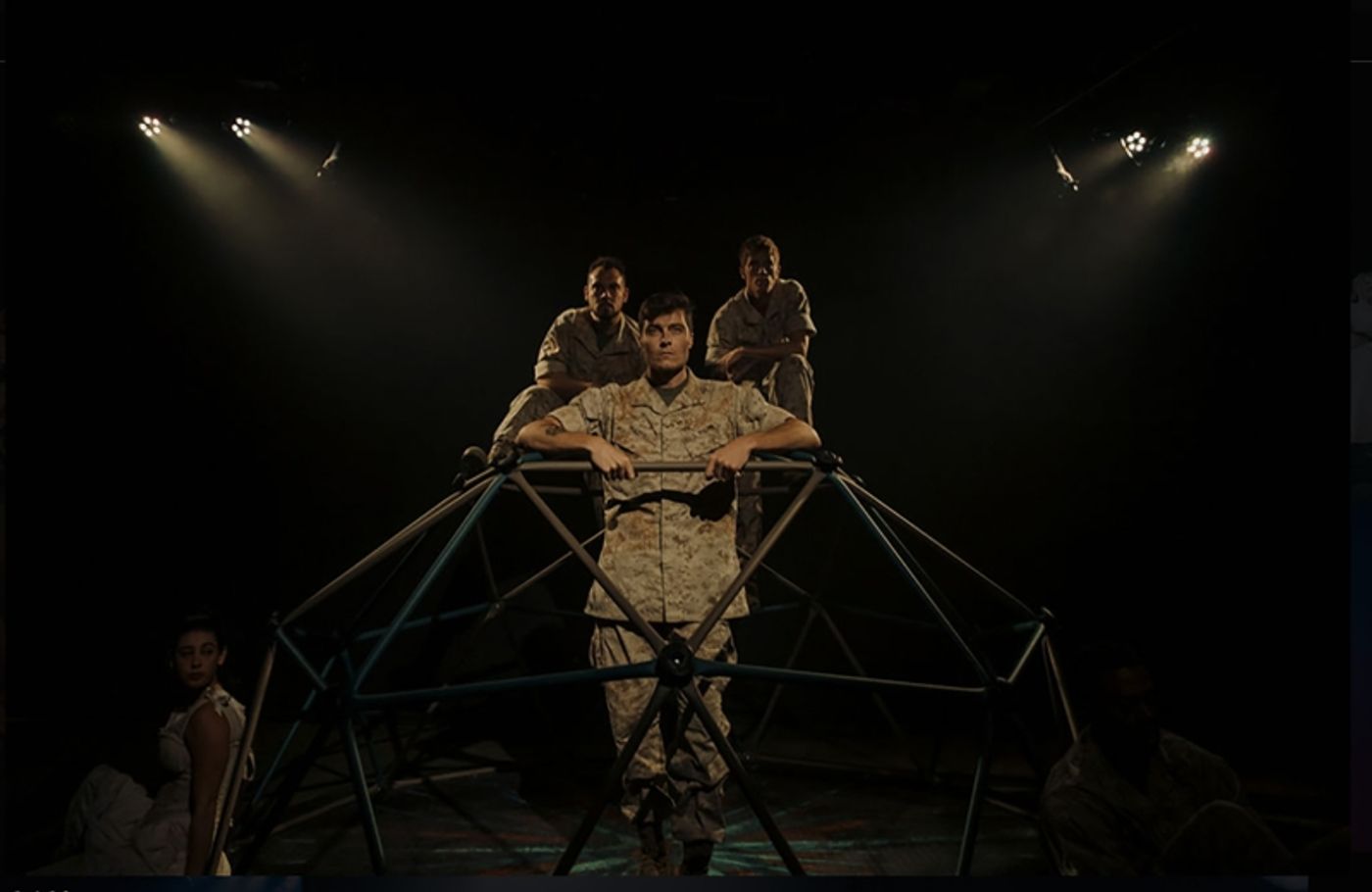
The cast of Mama Mama Can't You see. at Studio/Stage. Photo credit: Meredith Adelaide
What has been the most surprising or most difficult aspect for you personally while working on this play?
Surprising? The number of new things we keep learning about the piece on a daily basis, despite having worked on it for several years and through multiple iterations. I don’t think that’s a reflection of “not interrogating it deeply enough” before; I think it’s a reflection of how rich this text is, that it can hold us through (and hold up to) several versions of ourselves across a global pandemic, and still have deep new insights for us to glean.
Difficult? I don’t know. Knowing when to walk away? Haha. I mean, it’s a wildly difficult show. The text is complicated, the stage directions are impossible, it’s highly physical, the tech is intricate, and the whole thing is about how to put words to something for which there are no words. But all the creative challenges of the piece are rewarding and life-affirming. I suppose one difficult aspect has to do with re-mounting it, and not just wanting to accept everything we discovered before as the right way to do it - trying to hold that previous version as beautiful, as viable, without locking ourselves into one correct way to build this version.
But yeah. I think the hardest thing is going to be walking away from this piece when it’s over. I’ve spent so much of my adult life making sense of this play, especially since I’ve literally been dreaming up this piece with Stan and Cecilia since I was 24. I’m an old man now, Shari. I’m in my ’30s. This play means something to me. In the darkest days of the pandemic, Mama Mama gave me something to hold onto. And I’m not sure what happens to it after this iteration.
I remember when being in my thirties seemed old…. and it makes me laugh now. What do you expect audiences will be talking about after leaving the theater?
“WOW, I’m really excited to see what Coin & Ghost does next with the large sum of money I just donated to them!” In all seriousness – the play leaves a lot up to interpretation, and I expect audiences will leave discussing and debating what certain moments mean, or unpacking images they saw, or sharing their own stories. The show is built around getting these characters to open up in a way that acts as a springboard to get audiences to open up as well. It’s an act of generosity.
Tell me why you decided to use such a graphic image on the poster. Was it to let audiences know this is not a pro-war play?
Love this question. The poster design is a riff on the cover of Dalton Trumbo’s Johnny Got His Gun (which is, admittedly, one of the great anti-war novels of all time).
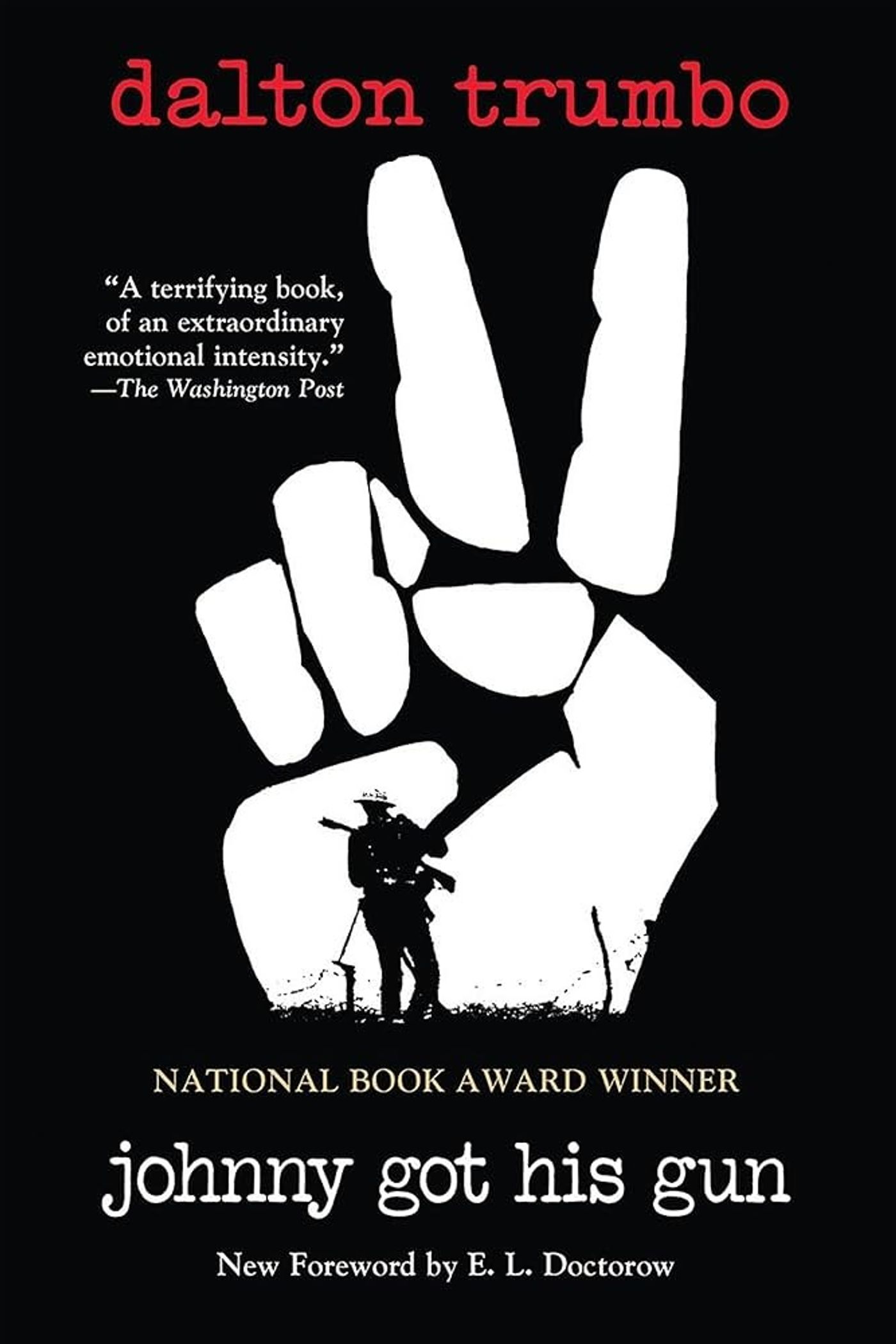
That said, I’m not sure the intention of our poster was ever to telegraph a strong anti-war message, as much as it was designed to communicate tone. The production has a rock & roll sensibility to it, one that permeates its poetry and aesthetic. We’re gonna talk about the beast, we’re gonna stare it in the eye, but we’re also not being too holy about the thing. We’ll give it to you straight. There’s also an understanding amongst the team that our primary graphic is jarring, and that’s okay since war is jarring. These stories are jarring. So in a sense, the poster acts as a primer, it sets the stage. If you’re gonna step into the arena with us, you should not be expecting a polite, delicate night at the theatre. Expect fireworks.
Anything else you would like to add?
Just that I’m grateful, is all.
Grateful to live in such a great theatre town.
Grateful to be surrounded by badass collaborators.
And grateful that Cecilia and Stan trusted me with such a gorgeous new play.
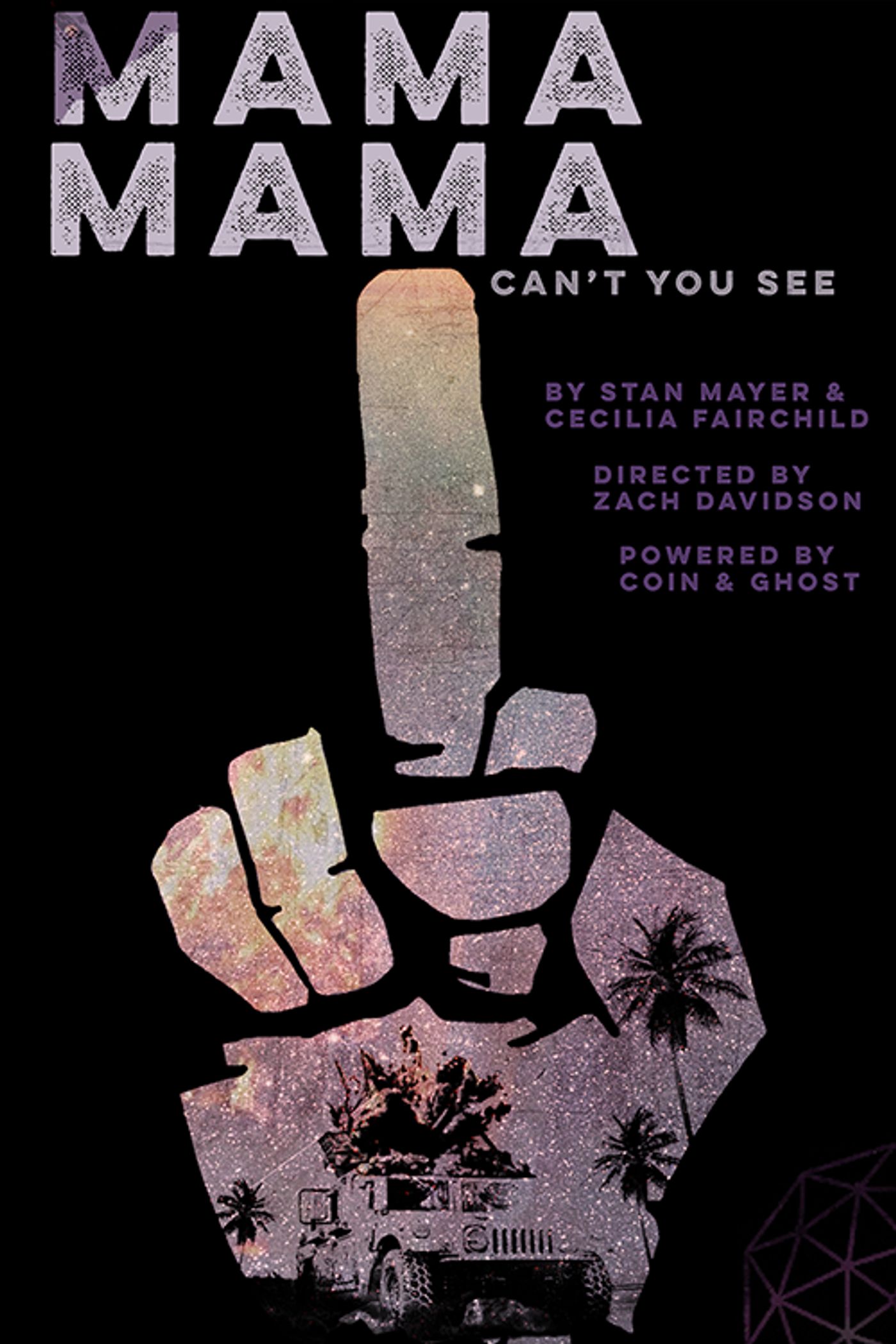
Mama Mama Can’t You See runs from November 10 (the official birthday of the U.S. Marines) through December 10, with performances on Thursdays, Fridays and Saturdays at 8 p.m. and Sundays at 7 p.m. (dark November 23 through November 26.) Tickets range from $5 to $35: general admission is $35, except opening weekend (Nov 10–Nov. 12) which is pay-what-you-choose starting at $5. Studio/Stage is located at 520 N Western Ave., Los Angeles, CA 90004. For reservations and information, go to coinandghost.org. Arrive early as only street parking is available, and be sure to read signs carefully.
Warning: This play contains vivid descriptions of war and violence that may be triggering to some audiences, particularly those with combat experience and/or post-traumatic stress disorder. The production makes use of explicit/graphic language, simulated sex acts, herbal cigarettes, theatrical haze, strobe lighting effects and sudden loud sounds. Recommended for mature audiences ages 16 and up.
Videos

